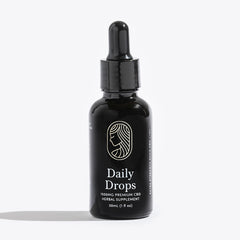 Sleep is simultaneously one of the most (if not the most) important elements of health and wellness, and also something too many of us struggle with on a daily basis. More than one-third of US adults get less than seven hours of sleep on average, which is not only physically and mentally exhausting but can also have a longer-term impact on one’s health. <1> Adults who consistently get less than seven hours of sleep per night have been linked to having higher instances of cardiovascular disease, obesity, diabetes, weakened immune system, depression, anxiety as well as impaired thinking and memory. <2>
Sleep is simultaneously one of the most (if not the most) important elements of health and wellness, and also something too many of us struggle with on a daily basis. More than one-third of US adults get less than seven hours of sleep on average, which is not only physically and mentally exhausting but can also have a longer-term impact on one’s health. <1> Adults who consistently get less than seven hours of sleep per night have been linked to having higher instances of cardiovascular disease, obesity, diabetes, weakened immune system, depression, anxiety as well as impaired thinking and memory. <2>
In this article we’ll tackle the following questions: what is sleep, why do so many people struggle with it and, perhaps most importantly, how can we get our sleep patterns back on track?
How Sleep Works: A Look Inside Your Body At Rest
Sleep is a complex process that affects nearly all systems within the body. Multiple areas of the brain are involved in the processing of hormones and chemicals that regulate sleep and wakefulness. We can distill the complexity of sleep science down to a few simple key topics.
Here’s what going on in your body when you lay down to go to sleep:
Sleep-wake homeostasis
This essentially means that the longer a person is awake the more they will feel a need to sleep. This is also defined as sleep pressure. The hormone responsible for this is sleep pressure is adenosine which builds up in the body when we’ve been awake for a long time. This drive is also what causes someone to sleep more deeply after a period of insufficient sleep. <2>
Circadian rhythms
Circadian rhythms are the body’s internal clock, governing our sleep-wake cycle and helping us function at our best. The suprachiasmatic nucleus (SCN), our master clock located in a part of our brain called the hypothalamus, synchronizes these rhythms based on light cues. <2> During the day, light activates our master clock, causing us to be active and alert. When the sun goes down, the master clock begins the production of melatonin, promoting sleep. Disruptions to our circadian rhythms can lead to sleep issues, affecting our overall well-being. <2>
Non-REM (rapid eye movement)
Non-REM sleep encompasses the first 3 stages of sleep which includes deep sleep where growth and repair occur. Eye movement is slower in these stages, hence the name non-REM. Most people spend more time in non-REM sleep during the first half of the night.
REM
During REM sleep, our brain processes and consolidates information from the day. Although our eyes are closed they can be seen moving quickly back and forth during this stage. REM sleep helps to strengthen memories and clear out irrelevant information, allowing us to wake up feeling refreshed and ready to tackle new challenges. As the night goes on it is common to spend more time in REM sleep. <2>
Additionally, we go through multiple sleep cycles in a night which can last anywhere between 70 to 120 minutes each. Within each sleep cycle, there are four different sleep stages. The first three stages are non-REM sleep and the fourth stage is REM sleep, important for learning and memory. The most restorative or deep sleep occurs in the first half of the night whereas more REM sleep occurs later in the night. <2>
In a typical night, a person may go through four to six sleep cycles lasting on average 90 minutes each. Sleep cycles differ from person to person depending on age, recent sleep patterns, alcohol consumption, and sleep disorders.
What Affects Sleep Quality?
Lifestyle and environmental factors
 Busy schedules, irregular sleep patterns, excessive screen time, noise, light, and uncomfortable sleeping environments can all impact sleep quality. Alcohol consumption may appear to make it easier to fall asleep however as its effects wear off it can cause sleep disruptions later in the night. <3> Caffeine metabolism differs from person to person therefore the time it takes for half the caffeine to be eliminated from the body can range from 2-12 hours. This means some individuals may still have circulating amounts of caffeine in their bodies as they are getting into bed! Stress and anxiety can have a significant impact on sleep by altering the structure of our sleep cycle with disruptions in deep and REM sleep. Additionally, when stressed the body may produce more cortisol, a stress hormone, which can interfere with the natural sleep-wake cycle. <2>
Busy schedules, irregular sleep patterns, excessive screen time, noise, light, and uncomfortable sleeping environments can all impact sleep quality. Alcohol consumption may appear to make it easier to fall asleep however as its effects wear off it can cause sleep disruptions later in the night. <3> Caffeine metabolism differs from person to person therefore the time it takes for half the caffeine to be eliminated from the body can range from 2-12 hours. This means some individuals may still have circulating amounts of caffeine in their bodies as they are getting into bed! Stress and anxiety can have a significant impact on sleep by altering the structure of our sleep cycle with disruptions in deep and REM sleep. Additionally, when stressed the body may produce more cortisol, a stress hormone, which can interfere with the natural sleep-wake cycle. <2>
Medical conditions, genetics, and hormonal changes

Certain medical conditions, such as sleep apnea, restless leg syndrome, and chronic pain, or the unique challenges presented by hormonal changes during menopause or pregnancy can make it difficult to get a good night’s sleep. Additionally, some medications can interfere with sleep, leading to sleep difficulties <2> As women enter menopause nearly 40% experience struggles with sleep due to the drop in estrogen and progesterone. These hormones are involved in processes that affect sleep, mood, appetite, sex drive, and much more. <4>
Aging
 It is recommended that adults 18 years and older get at least seven hours of sleep at night. Babies, children, and teens need even more sleep to facilitate growth and development. <5> Medical conditions as mentioned in the previous point may impact the quality of sleep for an older adult. As we age changes in our brains affect our circadian rhythms making it more difficult to fall and stay asleep. Additionally, the amount of restorative sleep decreases with age. It is also a common misconception that because of the changes that occur in the aging process, older adults need less sleep, however, the goal during this phase of life is still at least seven hours of sleep per night. <6>
It is recommended that adults 18 years and older get at least seven hours of sleep at night. Babies, children, and teens need even more sleep to facilitate growth and development. <5> Medical conditions as mentioned in the previous point may impact the quality of sleep for an older adult. As we age changes in our brains affect our circadian rhythms making it more difficult to fall and stay asleep. Additionally, the amount of restorative sleep decreases with age. It is also a common misconception that because of the changes that occur in the aging process, older adults need less sleep, however, the goal during this phase of life is still at least seven hours of sleep per night. <6>
The Crucial Role of Sleep in Health and Vitality
A lack of sleep can have a detrimental effect on various functions of our well-being:
- Stress: Sleep deprivation puts our body under stress and triggers the release of stress hormones. <5> Likewise, the more stress we feel the harder it is to get good quality sleep.
- Aging. Our bodies need sleep to heal and repair from daily wear and tear. One study showed that individuals who slept for 5 hours or less had increased water loss from their skin, less skin barrier recovery after exposure to ultraviolet light, and lower skin satisfaction compared with those who got 7-9 hours of sleep. <11>
- Immunity: Sleep is crucial in maintaining a healthy immune system, helping it fight off infections and illnesses. <5> During sleep certain aspects of the immune system, such as cytokines, get activated to support our body’s immune and inflammation response. Experts are not sure why this happens during sleep however many think that when we are resting breathing and muscle activity slows down it allowing energy for the immune system to perform these crucial functions. <11>
- Chronic health conditions: Sleep deprivation has been linked to diabetes, cardiovascular disease, obesity, and depression. <5>
- Hormonal imbalances: Sleep deprivation can lead to imbalances in hormones that regulate appetite, metabolism, and stress. <5>
- Cognitive function: Sleep is essential for brain function, lack of it can impair memory, concentration, and decision-making. <5>
- Accidents: Sleep deprivation can impair judgment and reaction time, increasing the risk of accidents. <5>
- Mood changes: Lack of sleep can lead to irritability, anxiety, and depression. <5>
 How Sleep Affects Brain Function and Focus
How Sleep Affects Brain Function and Focus
Sleep plays a crucial role in brain function, and it can affect many aspects of cognitive performance, emotional regulation, and overall health. Here are some of the ways that sleep impacts the brain:
- Memory consolidation: During sleep, the brain processes and consolidates memories <8>
- Brain plasticity: Sleep plays a role in our brain’s ability to change and adapt in response to experiences. <8>
- Cognitive function: Adequate sleep is essential for cognitive performance, including attention, decision-making, and problem-solving. <8>
- Emotional regulation: Sleep plays a vital role in emotional regulation, helping to regulate mood and reduce the risk of mood disorders such as depression and anxiety. <8>
- Physical health: In addition to its impact on brain function, sleep is also important for overall physical health. Chronic sleep deprivation has been linked to a range of health issues, including obesity, diabetes, and cardiovascular disease. <8>
Techniques For Improving Sleep Quality
Sleep hygiene is a set of environmental and behavioral practices that are designed to remove barriers to sleep. Research is mixed as to whether these behaviors are proven to promote better sleep quality however they are inexpensive and accessible actions to take. Failure to implement good sleep hygiene may affect sleep quality. Below are some tips to consider:
- Stick to a regular sleep schedule: Going to bed and waking up at the same time every day can help regulate the body’s natural sleep-wake cycle. Set a bedtime that is early enough for you to get at least 7-8 hours of sleep. <3>
- Create a relaxing sleep environment: Keep the bedroom dark, cool, and quiet to promote a peaceful sleeping environment. Consider using a comfortable mattress and pillow as well. Use your bed only for sleep and sex. <3>
- Limit caffeine and alcohol: Caffeine and alcohol can interfere with sleep quality, so it’s best to limit consumption, especially in the hours leading up to bedtime. Also, reduce your fluid intake before bedtime. <3>
- Don’t eat a large meal before bedtime: If you are hungry at night, eat a light, healthy snack. <3>
- Practice relaxation techniques: Techniques such as deep breathing, meditation, and progressive muscle relaxation can help calm the mind and body, making it easier to fall asleep. <3>
- Exercise regularly: Regular exercise can improve sleep quality, but it’s important to avoid strenuous exercise too close to bedtime, as it can be stimulating. <3>
- Avoid electronic devices before bedtime: The blue light emitted by electronic devices can interfere with sleep quality, so it’s best to avoid using them in the hours leading up to bedtime. Limit exposure to bright light in the evenings and start the day with exposure to morning light. <3>
- Don’t go to bed unless you are sleepy: If you don’t fall asleep after 20 minutes, get out of bed. Go do a quiet activity without a lot of light exposure. It is especially important to not get on electronics. <7>
- Consult with a healthcare provider: If sleep difficulties persist, it’s important to consult with a healthcare provider, who may recommend additional interventions, such as medication or sleep studies. <7>
For more sleep tips be sure to check out our Sleep Primer!
 Natural Sleep Aids And Remedies
Natural Sleep Aids And Remedies
- Practicing relaxation techniques: Techniques such as deep breathing, meditation, and yoga can help reduce stress and promote relaxation, making it easier to fall asleep. <3>
- Exercise: Regular exercise can help promote better sleep quality, but it’s important to avoid exercising too close to bedtime, as this can make it harder to fall asleep. <3>
- Herbal remedies: Certain herbs, such as valerian root, chamomile, and lavender, have been shown to have mild sedative effects and may help promote relaxation and sleep. <9>
- Melatonin supplements: Melatonin is a hormone that regulates sleep and wakefulness, and taking a melatonin supplement can help regulate the sleep-wake cycle. However, it’s important to talk to a healthcare provider before taking melatonin, as it can interact with certain medications. <9>
- Magnesium: Although research is still emerging magnesium may help to support the production of melatonin, a hormone that regulates the sleep-wake cycle. It may also have a calming effect on the nervous system, which can help reduce stress, a huge factor that can significantly impact sleep quality. <10>
- CBD/CBN: These cannabinoids interact with our Endocannabinoid System (ECS); a network of receptors in your body that is responsible for maintaining homeostasis, or balance, across all systems in your body including our sleep-wake cycle. <11>
Natural remedies may not work for everyone, and it’s important to talk to a healthcare provider if sleep difficulties persist or significantly impact daily functioning.
The Takeaway…
In summary, sleep is a complex process that is essential for an optimal feeling of wellness. When we lack sleep it can have detrimental effects on our physical, emotional, and mental health. There are many tips and natural remedies we can implement to improve our sleep hygiene however when sleep problems persist it’s important to reach out and get professional help.
Resources:
- CDC Newsroom. CDC. Published January 1, 2016. Accessed July 19, 2023. https://www.cdc.gov/media/releases/2016/p0215-enough-sleep.html
- How Sleep Works: Understanding the Science of Sleep. Sleep Foundation. Published October 23, 2020. Accessed June 8, 2023. https://www.sleepfoundation.org/how-sleep-works
- What Is Sleep Hygiene? Sleep Foundation. Published April 17, 2009. Accessed June 8, 2023. https://www.sleepfoundation.org/sleep-hygiene
- How Can Menopause Affect Sleep? Sleep Foundation. Published January 22, 2021. Accessed August 3, 2023. https://www.sleepfoundation.org/women-sleep/menopause-and-sleep
- Sleep Deprivation: Causes, Symptoms, & Treatment. Sleep Foundation. Published November 3, 2020. Accessed June 9, 2023. https://www.sleepfoundation.org/sleep-deprivation
- Aging and Sleep: How Does Growing Old Affect Sleep? Sleep Foundation. Published November 18, 2020. Accessed July 19, 2023. https://www.sleepfoundation.org/aging-and-sleep
- Troy D. Healthy Sleep Habits. Sleep Education. Accessed June 9, 2023. https://sleepeducation.org/healthy-sleep/healthy-sleep-habits/
- What Happens When You Sleep: The Science of Sleep. Sleep Foundation. Published December 22, 2009. Accessed June 9, 2023. https://www.sleepfoundation.org/how-sleep-works/what-happens-when-you-sleep
- Sleep Aids: Types, Benefits, Safe Use, & Side Effects. Sleep Foundation. Published April 13, 2022. Accessed June 9, 2023. https://www.sleepfoundation.org/sleep-aids
- Using Magnesium for Better Sleep. Sleep Foundation. Published May 20, 2021. Accessed June 9, 2023. https://www.sleepfoundation.org/magnesium
- Kaul M, Zee PC, Sahni AS. Effects of Cannabinoids on Sleep and their Therapeutic Potential for Sleep Disorders. Neurotherapeutics. 2021;18(1):217-227. doi:10.1007/s13311-021-01013-w




